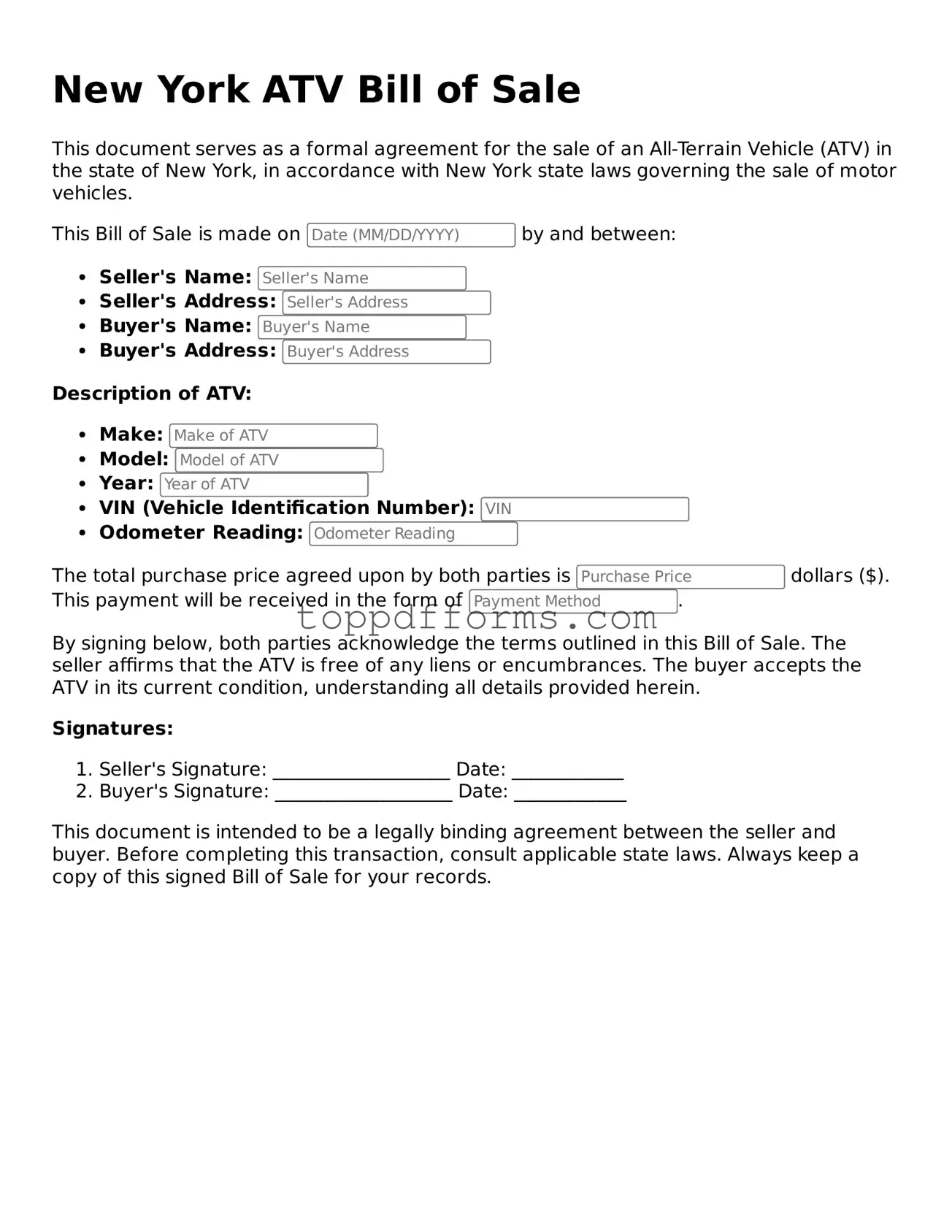ATV Bill of Sale Document for New York State
Things You Should Know About This Form
What is an ATV Bill of Sale form in New York?
An ATV Bill of Sale form is a legal document that records the transaction between a buyer and a seller of an all-terrain vehicle (ATV) in New York. This form captures essential details such as the make, model, year, and Vehicle Identification Number (VIN) of the ATV. It also includes the names and addresses of both parties involved in the sale, as well as the sale price. This document serves as proof of ownership transfer and can be essential for registration and titling purposes with the Department of Motor Vehicles (DMV).
Why is it important to use an ATV Bill of Sale form?
Using an ATV Bill of Sale form is crucial for several reasons. First, it provides a clear record of the transaction, which can protect both the buyer and the seller in case of disputes. If any issues arise regarding ownership or condition after the sale, this document can serve as evidence. Additionally, it is often required for registering the ATV with the DMV, ensuring that the new owner can legally operate the vehicle. Without this form, complications may arise when attempting to transfer ownership or register the ATV.
What information should be included in the ATV Bill of Sale form?
The ATV Bill of Sale form should include specific information to be effective. Key details include the date of the sale, the full names and addresses of both the buyer and seller, and a description of the ATV, including its make, model, year, and VIN. The sale price must also be clearly stated. Furthermore, both parties should sign and date the document to indicate their agreement to the terms of the sale. Including any additional terms or conditions can also be beneficial, especially if there are warranties or specific agreements made between the parties.
Do I need to have the ATV Bill of Sale notarized?
In New York, notarization of the ATV Bill of Sale is not a legal requirement, but it is highly recommended. Having the document notarized adds an extra layer of authenticity and can help prevent disputes in the future. A notary public verifies the identities of both parties and confirms that they willingly signed the document. While it may not be mandatory, notarization can enhance the credibility of the transaction and provide peace of mind for both the buyer and seller.
PDF Overview
| Fact Name | Description |
|---|---|
| Purpose | The New York ATV Bill of Sale form is used to document the sale or transfer of an all-terrain vehicle in New York State. |
| Governing Law | This form is governed by New York Vehicle and Traffic Law, specifically sections related to vehicle registration and ownership transfer. |
| Required Information | The form typically requires details such as the buyer's and seller's names, addresses, the ATV's make, model, year, and Vehicle Identification Number (VIN). |
| Signatures | Both the seller and buyer must sign the form to make the sale legally binding, ensuring a clear transfer of ownership. |
Common mistakes
When filling out the New York ATV Bill of Sale form, one common mistake is failing to provide complete information about the vehicle. This includes not only the make and model but also the Vehicle Identification Number (VIN). Without this critical information, it may be challenging to establish ownership or register the ATV later. Buyers and sellers should ensure that every detail is accurately recorded to avoid complications.
Another frequent error is neglecting to include the purchase price. The form requires a clear statement of the amount paid for the ATV. Omitting this detail can lead to issues with tax assessments and registration. Both parties should agree on the price and document it clearly on the form to prevent any misunderstandings in the future.
Many individuals also overlook the importance of signatures. Both the seller and the buyer must sign the Bill of Sale for it to be legally binding. Failing to obtain both signatures can render the document invalid, which might complicate ownership transfer. It's essential to double-check that all necessary signatures are present before finalizing the sale.
Lastly, not keeping a copy of the completed form is a mistake that can lead to difficulties later on. Both parties should retain a copy of the Bill of Sale for their records. This document serves as proof of the transaction and may be required for future reference, such as when registering the ATV or if any disputes arise. Keeping a copy ensures that both the buyer and seller have access to the necessary information.
Other Common State-specific ATV Bill of Sale Forms
Atv Bill of Sale Printable - The ATV Bill of Sale can help fulfill state-specific requirements for vehicle sales.
To simplify the application process for those interested in joining this esteemed organization, applicants can conveniently access the Chick-fil-A Job Application form online. It is essential for candidates to fill out this form accurately, providing relevant details about their skills and experiences. For easy access, the application can be found through resources like My PDF Forms, ensuring that potential team members have all the necessary tools to embark on their journey with Chick-fil-A.
Pa Atv Laws - Makes clear any additional details, such as payment methods.
Vehicle Bill of Sale Without Notary - The Bill of Sale also safeguards against liability claims after the sale.
Atv Bill of Sale Pdf - May require signatures from both the buyer and seller.
